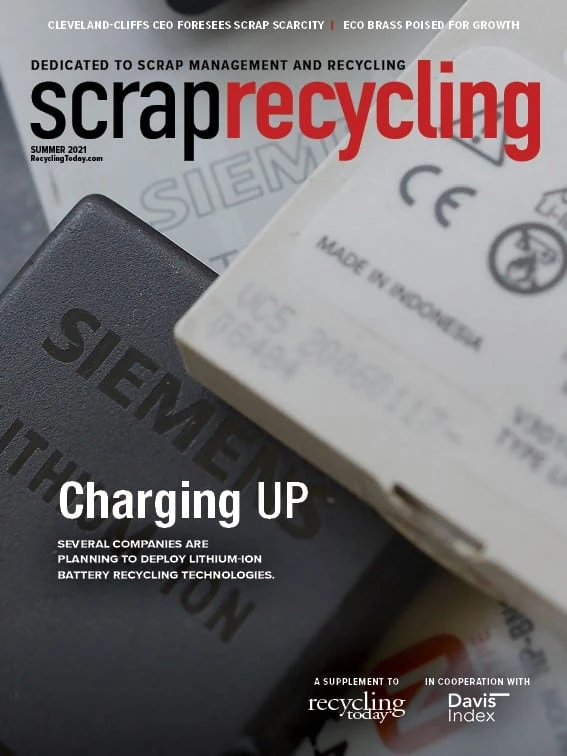
The Proler name has been among the most recognized surnames in the scrap recycling industry for decades. Despite that, Becky Proler’s father, Jackie Proler, never expected that she would work in the industry when she was growing up.
Proler spent a chunk of her career in psychology (she has a master’s degree in counseling psychology from Temple University in Philadelphia), but her father eventually did offer her a job with the family company in pick-a-part business. Proler was living on the East Coast at the time and says her dad wanted her to return to Houston, so he gave her the opportunity to run that division in the 1980s.
Today, Proler co-owns Southern Core Recycling in Houston. She and her business partners, Alan and Carol Walker, founded the company in 1989. As the auto core industry changed, Southern Core reinvented itself as a full-service scrap company that specializes in shredded cast and aluminum as well as other forms of ferrous and nonferrous scrap.
Proler shares some of her experiences in the scrap industry in the edited Q&A that follows.
Q: It’s safe to say there are fewer women serving as executives in the scrap industry than men. To what extent have you had to overcome any barriers as a woman running a scrap company?
A: I understand why people ask that question. But the answer is, for me, it is what it is. I can’t change my gender any more than I could change my last name. I think that the industry is starting to be more aware that there are females out there that either own, run or are in leadership positions. Even in some of the large companies, you’ve got [women] in leadership positions. [Commercial Metals Co.] has a female president. Umicore has a female senior vice president. OmniSource has somebody on their board that’s a female. Schnitzer Steel has a female president.
I feel very comfortable in my role as a female in the scrap metal business. It wasn’t easy, but then again, I don’t know what easy is. But I do think that ISRI, our national trade association, has done a very good job at nurturing this gender issue and supporting it. We have Women in Recycling now, which I think is a good group, and there’s going to be mentoring that’s going on.
Q: What can you tell us about the Proler family’s role as shredding pioneers?
A: My uncles, Sammy, Izzy and [Herman] “Hymie,” and my father were able to develop and innovate a process to actually size material so that you could get the material that the mills didn’t want out. It was revolutionary.
My uncle Hymie Proler passed away last year, right before COVID. I was able to speak at his funeral. The one thing I said to people [at the funeral] is, “You know, the chairs that you’re sitting on, the metal in those chairs is probably recycled. And it went through a process that this man that we are here to honor helped develop, and that car or that Uber that you took to the funeral today could have been shredded in the original Prolerizer.” So, I’m very proud of that. When you have family members that set the bar that high, it’s very hard to get over that pressure.
Q: Considering the auto salvage aspects to your career, what do you make of the emergence of electric vehicles (EVs) and the scrutiny on fossil fuels?
A: Well, I know in terms of where we’re going with electric vehicles, I think it’s a natural progression. We have to look at other ways—the greenhouse effect is definitely a concern. Even the oil industry folks admit that. So, the question is: What’s the best way to advance our technology and maintain the equilibrium that people are used to seeing?
On the recycling side, you’ve got to remember, we see end-of-life vehicles. There’s always a lot of focus on manufacturing and coming up with new ways to harness energy and new ideas, making a car lighter—that’s why we’re using aluminum bodies now instead of steel.
The big challenge is how do we focus on end of life? Because we’re starting to see this in the supply chain now. These hybrid cars with the batteries, all of these vehicles are now starting to come in through our domain. And how we deal with them is something that is cause for concern. … We’re going to have lithium batteries in these cars.
In fact, two weeks ago in Houston, there was a Tesla that caught on fire. It took the fire department 30,000 gallons of water to put the fire out. So, these things are concerning the manufacturer. I get the fact that their main focus is building the vehicle. But, eventually, you have to deal with end of life.
And that’s my concern. What do we do with this material when it gets to its loss-of-use point? I am more than comfortable with dealing with that. But I’m not sure that we’ve advanced innovation enough to know how to.

Explore the Summer 2021 Scrap Recycling Issue
Check out more from this issue and find your next story to read.
Latest from Recycling Today
- BMW Group, Encory launch 'direct recycling’ of batteries
- Loom Carbon, RTI International partner to scale textile recycling technology
- Goodwill Industries of West Michigan, American Glass Mosaics partner to divert glass from landfill
- CARI forms federal advocacy partnership
- Monthly packaging papers shipments down in November
- STEEL Act aims to enhance trade enforcement to prevent dumping of steel in the US
- San Francisco schools introduce compostable lunch trays
- Aduro graduates from Shell GameChanger program





